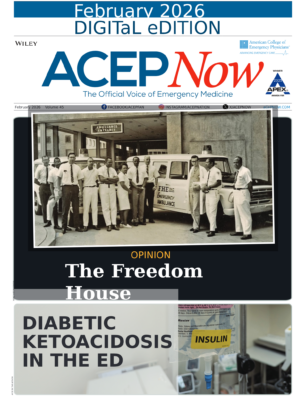Experts have estimated that defensive medicine wastes up to $210 billion annually. Medicolegal concerns have been cited in previous published reports as a contributing factor to the ordering of unnecessary tests. Not only does defensive medicine add to the bottom line of health care costs, additional tests, medications, and hospital admissions may adversely affect patient care by increasing radiation exposure, adverse medication reactions, and nosocomial infections. This study was undertaken to describe physicians’ self-reports of frequency of additional testing, patient instructions, medications, prescriptions, and admissions related to medicolegal concerns.
Explore This Issue
ACEP News: Vol 32 – No 07 – July 2013Methods
This prospective, observational survey study was conducted at the University of Toledo, an urban, university hospital with an annual census of 34,000. The study was approved by the University of Toledo Institutional Review Board. Participants included consenting Emergency Department (ED) attending and resident level physicians. Data were collected by a survey questionnaire, administered by a research assistant, during May to July 2012. Information collected included self-reported prospective judgments regarding individual cases. Physicians were asked to judge, regarding each specific case, their reports of diagnostic testing, patient instructions, medications, prescriptions, and hospital inpatient admissions related to medicolegal concerns.
Results
Among 468 patient encounters, 26 emergency department physicians treated these patients during the study period. Nine attendings completed 243 surveys and 17 residents completed 225 surveys.
Emergency physicians report that if there were no medicolegal concerns in the practice of medicine today, they would have ordered fewer diagnostic tests in 23% of cases (95% CI: 19-26%), provided less detailed patient instructions in 4% of cases (95% CI: 2-6%), fewer medications in the ED in 2% of cases (95% CI: 1-3%), and fewer outpatient prescriptions in 3% of cases (95% CI: 1-4%). Among 113 admitted patients, physicians reported that they would have discharged 6% of patients if there were no medicolegal concerns.
Discussion
Numerous studies have cited concerns about medical liability as a contributing factor towards unnecessary testing and increased health care costs. Several means have been proposed to reduce the impact of defensive medicine. Several organizations including the ACEP and the American Tort Reform Association endorse liability reform packages including caps on non-economic damages; controls on attorneys’ contingency fees; structured or periodic payment of future damages; replacing joint and several liability; recognition of collateral sources of compensation; statutes of limitations; and qualifications for expert witnesses.
Conclusions
Emergency physicians report that if there were no medicolegal concerns in the practice of medicine today, they would have ordered fewer diagnostic tests in 23% of cases. The cost of defensive medicine is significant in the practice of emergency medicine.
Dr. Catherine A. Marco is a professor and program director, emergency medicine residency at the University of Toledo College of Medicine. She is also a member of the ACEP News Editorial Advisory Board. Mr. Miyake and Mr. Summers are third-year medical students at the University of Toledo College of Medicine.
Pages: 1 2 | Multi-Page




No Responses to “Influence on the clinical practice of emergency medicine”